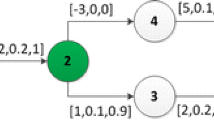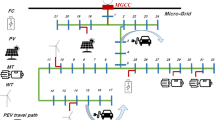Abstract
Electric vehicles have recently received increasing attention because of their positive environmental and economic impacts; however, such vehicles are still not gaining widespread popularity for practical use given the inconvenience of limited battery capacity and long recharge times. To compensate for these drawbacks, plug-in hybrid electric vehicles (PHEVs) have been proposed, which can be recharged using standard household plug-in sockets unlike normal hybrid vehicles. Thus, PHEVs can run for long distances using widely available electrical power. Scheduling routes for the efficient use of electrical power is essential for PHEVs to succeed. Therefore, in this paper, we consider the PHEV routing and scheduling problem. We first formulate this problem as a mixed-integer programming (MIP) problem. Next, we propose three algorithms using a labeling method for large-scale problems; an exact algorithm and two heuristic algorithms. Our computational experiments show that the routes obtained using our algorithms are cost-efficient; further, our heuristic algorithms are much faster than the MIP formulation.




Similar content being viewed by others
References
Adler JD, Mirchandani PB, Xue G, Xia M (2012) The electric vehicle shortest-walk problem with battery exchanges. Net Spatial Econ 1–19
Arslan O, Yildiz B, Karaşan OE (2015) Minimum cost path problem for plug-in hybrid electric vehicles. Transport Res Part E: Logist Transport Rev 80:123–141
Artmeier A, Haselmayr J, Leucker M, Sachenbacher M (2010) The shortest path problem revisited: optimal routing for electric vehicles. KI 2010: advances in artificial intelligence. Springer, Berlin, pp 309–316
Beasley JE, Christofides N (1989) An algorithm for the resource constrained shortest path problem. Networks 19(4):379–394
Christofides N, Eilon S (1969) An algorithm for the vehicle-dispatching problem. J Oper Res Soc 20:309–318
Dumitrescu I, Boland N (2001) Algorithms for the weight constrained shortest path problem. Int Trans Oper Res 8(1):15–29
Eisner J, Funke S, Storandt S (2011) Optimal route planning for electric vehicles in large networks. In: Proceedings of the twenty-fifth AAAI conference on artificial intelligence, pp 1108–1113
Erdogan S, Miller-Hooks E (2014) A green vehicle routing problem. Transport Res Part E: Logist Transport Rev 48(1):100–114
Lin C, Choy KL, Ho GT, Chung SH, Lam HY (2014) Survey of green vehicle routing problem: past and future trends. Expert Syst Appl 41(4):1118–1138
Ma Z, Callaway D, Hiskens I (2012) Optimal charging control for plug-in electric vehicles. Control Optim Methods Electr Smart Grids Power Electron Power Syst 3:259–273
Nejad M, Mashayekhy L, Grosu D, Chinnam R (2014) Optimal routing for plug-in hybrid electric vehicles. INFORMS Transportation Science (under second review)
Schneider M, Stenger A, Goeke D (2014) The electric vehicle-routing problem with time windows and recharging stations. Transport Sci 48(4):500–520
Schonfelder R, Leucker M, Walther S (2014) Efficient profile routing for electric vehicles. In: Internet of Vehicles Technologies Services, pp 21–30
Shemer N (2012) Better Place Unveils Battery-Swap Network. Jerusalem Post
Sioshansi R (2012) OR forum-modeling the impacts of electricity tariffs on plug-in hybrid electric vehicle charging, costs, and emissions. Oper Res 60(3):506–516
Storandt S (2012) Quick and energy-efficient routes: computing constrained shortest paths for electric vehicles. In: Proceedings of the 5th ACM SIGSPATIAL international workshop on computational transportation science, pp 20–25
Sweda TM, Klabjan D (2012) Finding minimum-cost paths for electric vehicles. In: Proceedings of 2012 IEEE international electric vehicle conference, pp 1–4
Acknowledgements
This work was supported by JSPS KAKENHI Grant Numbers 25750128.
Author information
Authors and Affiliations
Corresponding author
Rights and permissions
About this article
Cite this article
Murakami, K. Formulation and algorithms for route planning problem of plug-in hybrid electric vehicles. Oper Res Int J 18, 497–519 (2018). https://doi.org/10.1007/s12351-016-0274-5
Received:
Revised:
Accepted:
Published:
Issue Date:
DOI: https://doi.org/10.1007/s12351-016-0274-5




